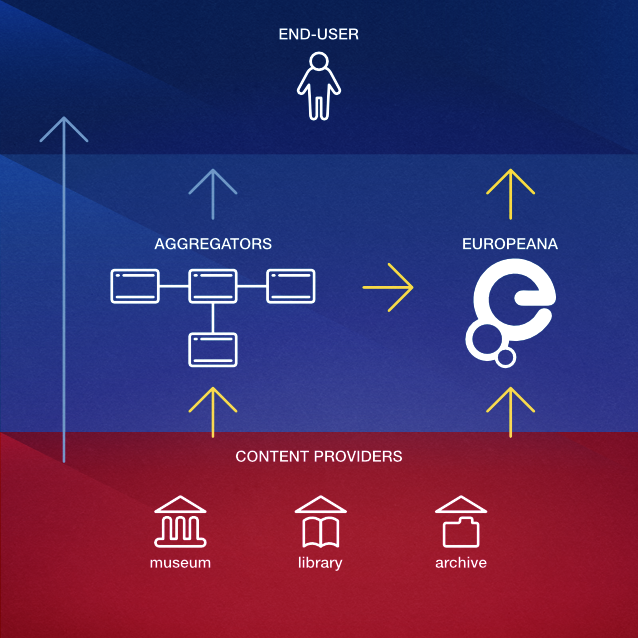MINTSERVICES
1/6 – Aggregators
Page Index
The aggregation landscape: Europeana and the European content aggregators' role
Aggregate is one of the four strategic tracks (aggregate, facilitate, distribute and engage) that underpins Europeana's future direction and business success. It is one of the means by which Europeana aims to guarantee:
- Source content that represents the diversity of the European cultural heritage
- Extend the network of aggregators
- Improve the quality of metadata
A national aggregation initiative in every EU member state is Europeana's aim by 2015.
National initiatives and aggregators – Google Maps
The map below shows each of the European aggregators that collect data from local institutions to distribute the metadata directly to Europeana.
Show National initiatives and aggregators in a bigger map.
An aggregator in the context of Europeana is an organisation that collects metadata from a group of content providers and transmits them to Europeana.
A content provider (or data provider) in the context of Europeana is any organisation that provides digital content accessible via Europeana. Europeana only ingests and indexes the institution's metadata, while the digital objects remain by the original institution.
A full list of Europeana's content providers is available at http://www.europeana.eu/portal/europeana-providers.html
Aggregators: what are they?
Functions
Aggregators gather material from individual organisations, standardise formats and metadata, channeling them into Europeana according to Europeana guidelines and procedures.
Aggregators also support content providers with administration, operations and training (see: Linked Heritage Project Aggregator).
Roles and responsibilities
Further key roles that aggregators play in other fields are the following:
- Disseminating the vision and the objectives of Europeana to their network of institutions in order to increase support for and involvement with Europeana
- Providing valuable feedback about the issues and discussions from their field
- Promoting and implementing standards farther along the content provision chain
- Providing domain-specific expertise and skills to institutions and Europeana
Types of aggregators
- Country Aggregators
- Regional aggregator
- National initiatives
- National aggregator
CulturaItalia
- Project Aggregators
Athena
Linked Heritage - Independent Organisations
Aggregators representation
| DOMAIN | Cross | Aggregate data across domains e.g. Erfgoedplus.be |
|---|---|---|
| Single | Data from a single domain at regional, national or international levels e.g. Apenet Project | |
| Thematic | e.g. Collections of Jewish culture project Judaica | |
| GEOGRAPHIC | Regional or national | Data at a regional and national level can be either single domain, e.g. national library, or cross-domain, e.g. collectionstrust.org.uk |
| Pan-European | Represent a specific segment or sector of cultural heritage by aggregating data on a European level, e.g. TheEuropeanLibrary.org | |
| National Aggregation Initiatives | Organisation(s) appointed by their Ministry to take on the role as aggregator in the country, and can be cross- or domain-specific. A cross-domain example is Hispana.mcu.es |
Accessibility
An aggregator may or may not have a portal where the content is made accessible to the public. For instance, this is the case of the Italian national aggregator CulturaItalia.
If the aggregator's portal is not accessible to the public, it is referred to as a dark portal or a dark aggregator. For instance, this is the case of MINT, the aggregator used within the Linked Heritage project.
Europeana Network
"The Europeana Network is an open forum for experts across Europe, from content providers and aggregators to providers of technical, legal and strategic knowledge and the creative industries. This forum represents and reflects the diversity of Europeana and gives its members an opportunity to voice their views.
[ ... ]
Every individual that contributes data, technology or knowledge to Europeana is encouraged to join the Europeana Network. Thus, if you have a stake in Europeana, then please register for membership".
[See: Europeana Network].







